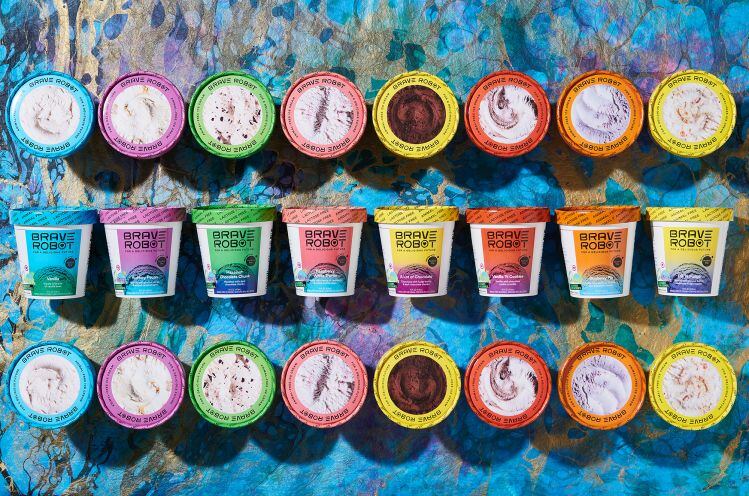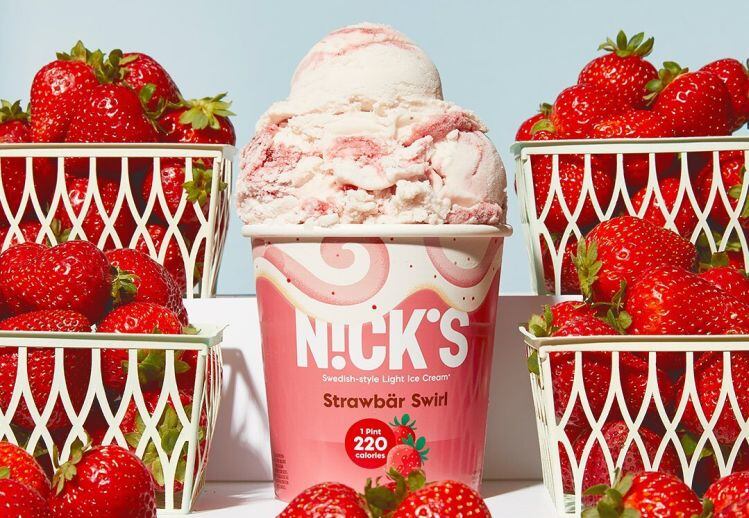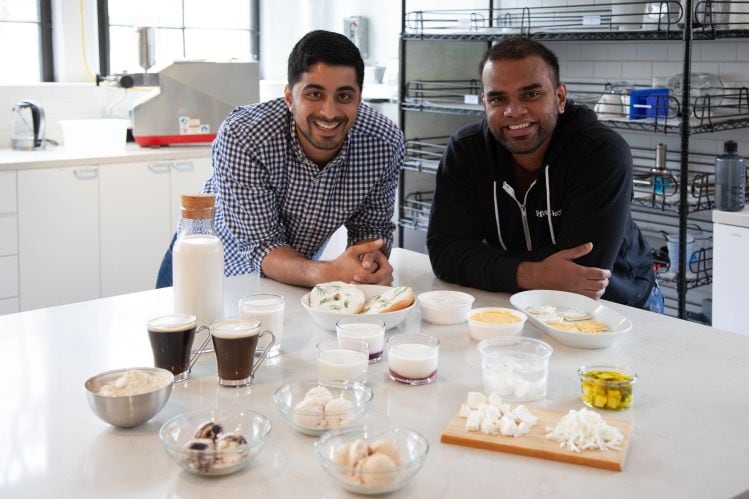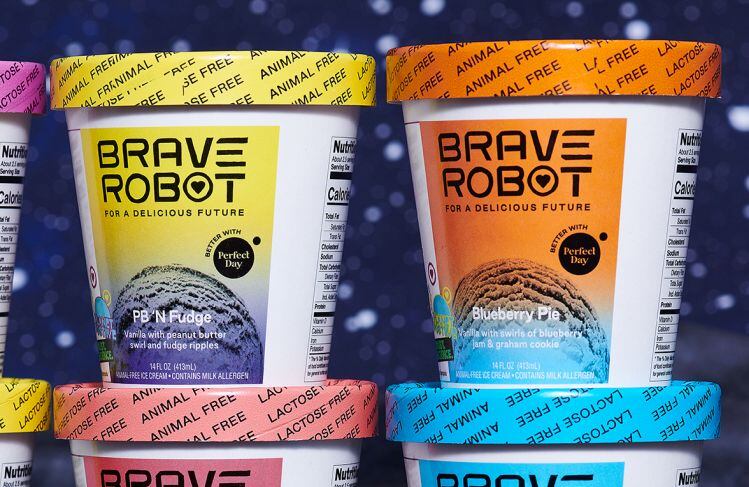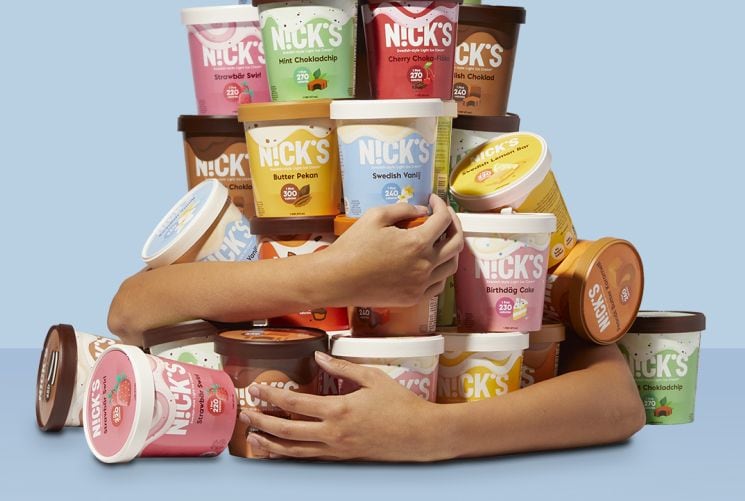While production of plant-based proteins has ramped up significantly, they do not always deliver the taste, nutrition and functionality of animal proteins, especially in formulations such as cheese and ice cream, prompting Perfect Day and others in the ‘precision fermentation’ space to explore new ways to produce whey, casein, egg albumin, collagen, pepsin and other highly functional proteins without industrialized animal agriculture, which they argue raises ethical and environmental concerns.
Rather than raising farm animals, Perfect Day uses DNA sequences which function like strings of computer code to instruct host micro-organisms (fungi, yeast, bacteria etc) to produce specific animal proteins when fed with sugars and other nutrients in big fermentation vessels, a technology that has been used in the food industry for years to produce everything from beta-carotene to vitamin B2.
Perfect Day’s non animal whey protein production ‘generates at least 85% and up to 97% fewer greenhouse gas emissions than conventional production methods’
Its hallmark ‘non animal whey protein’ – which now features in ice cream brands including Brave Robot, Nick’s, and Graeter’s, with more high-profile launches in the works – is produced via a strain of the filamentous fungus Trichoderma reesei and is identical to commercially available bovine-produced β-lactoglobulin.
The whey protein is secreted into the fermentation broth, concentrated via ultrafiltration/diafiltration and spray dried, a process that uses a certain amount of water, energy, land, and other inputs, but has nothing close to environmental footprint of whey from cows, co-founder Ryan Pandya told FoodNavigator-USA.
The company’s new lifecycle assessment (LCA) - conducted by consultancy WSP USA and critically reviewed by a panel of independent experts in conformance with ISO Standard 14067 on GHG emissions – showed that Perfect Day’s whey protein production generates at least 85% and up to 97% fewer greenhouse gas emissions than conventional production methods.
While the figure at the upper end of the scale presupposes that there is a market for the nutrient-rich co-product of the fermentation process, which accounts for a sizeable percentage of the biomass, the gap in GHG emissions between fermentation-based and animal-based production remains significant, he said.
“When we had the first LCA done [in 2015], that was a first stab, but here to have a panel of experts look at it and say this stands up to scrutiny is important, not only for Perfect Day and for our customers, but for the entire industry,” which he said needed to support general claims about sustainability with hard data.
Sustainable ingredients sourcing is “not a bonus anymore” to make firms' CSR reports look good, “it's critical, it's going to be core,” predicted Pandya.
“And to be able to do so in a way that truly doesn't require compromise on the part of your end consumer is massive, and that’s where we're seeing that excitement, because they [customers and potential customers] can see it on the consumer side now with brands like Brave Robot [which uses Perfect Day's non animal whey protein]. It’s amazing to see the response people are giving that brand.”
The co-product is ‘highly nutritious’
The co-product is “actually highly nutritious, more so than high value inputs for pet food are today in terms of bioavailable protein and amino acids and vitamins,” said Pandya. “So we haven't looked into turning it into a human food product per se, but you could easily imagine doing that; there are entire companies built on the concept of growing just fungal biomass and making better products.”
According to Perfect Day, protein characterization data show that its final whey protein product (which contains no genetically engineered fungi) is "identical to commercially available bovine-produced β-lactoglobulin," and as such presents no additional safety concerns – a determination rubber-stamped by the FDA last year via a coveted ‘no questions’ letter to Perfect Day’s GRAS determination.
Star power…
The lifecycle assessment was released as Perfect Day announced the formation of a new Sustainability & Health Advisory Council* including former USDA secretary Ann Veneman, Tufts University Professor Dariush Mozaffarian, and actor and environmentalist Leonardo DiCaprio, who said Perfect Day’s forward-looking vision “offers a new model for reducing the impact that our diets have on the planet.”
While cynics might query what useful advice an actor – albeit one that’s devoted a lot of energy to environmental causes - can offer a biotech startup, Pandya said each council member brought something unique to the table.
Meanwhile, having someone with DiCaprio’s influence talk to consumers about something no one had even heard of seven years ago (when Pandya and co-founder Perumal Gandhi first asked the question: Can you make dairy milk without cows?) was pretty exciting, he said.
“A bigger challenge for us than the technology itself is helping people understand what we're doing; hopefully through things like this we will be able to share our story and our message with people we would never have reached before.”
The Council will “guide Perfect Day on matters of health and wellness and the environment,” and includes:
- Okezue Bell — Creator, changemaker, ideator
- Leonardo DiCaprio — Academy Award winning actor and environmental activist
- Katharine Kreis — Country Director, Peace Corps Eswatini; formerly Director of Strategic Initiatives and Lead for Nutrition Innovation at PATH
- Dariush Mozaffarian — Professor at the Friedman School of Nutrition Science & Policy at Tufts University
- Danielle Nierenberg — President of Food Tank
- Mary Shelman — Former head of the Harvard Business School Agribusiness program and renowned agtech expert
- David Stukus, MD — Pediatric allergist/immunologist, researcher, and patient advocate
- Ann M Veneman — Former U.S. Secretary of Agriculture and UNICEF executive director
‘We have partners manufacturing at full scale for us in three different continents’
Perfect Day – which has raised more than $360m from investors including Temasek and Horizons Ventures to date, and teamed up with ingredients giant ADM to accelerate the development and commercialize its animal-free dairy proteins in late 2018 – highlighted a series of incremental improvements last year enabling it to increase the efficiency of its production process, substantially reducing costs.
He added: “There's not a lot of manufacturing capacity out there. But we have partners manufacturing at full scale for us in three different continents, and we've been able to show we can make a consistent product even as things differ in different geographies, where you have water with slightly different minerals and so on; we've built a robust enough process that that doesn't matter.”
Beyond ice cream: ‘I was blown away that, how well our protein performs’ in coffee
On the product development front, Perfect Day is talking to a wide variety of partners from startups to multinationals looking to develop a range of products utilizing its non animal whey protein.
“The really exciting stuff is yet to come in terms of cheese and yogurts," said Pandya.
"But to my surprise, there's also more functionality to be gained in the milk and creamer side than I realized a few years ago because if you try to create a cappuccino and you want a strong kind of stable foam, you can't really do that with plant based milk and in fact we heard this from one of the largest coffee companies in the world. And they're looking for that, they want that as a solution, which we can do. I was blown away that, how well our protein performs in that application.”
For Perfect Day spinoff The Urgent Company, more products could come out under the Brave Robot brand, he said. “There are categories it can comfortably step into that are adjacent, but there’s room for more than one brand to come out [for non-adjacent categories where Brave Robot might not make sense].”
‘What we're doing is like fundamentally oxymoronic’
Asked what Perfect Day has learned about consumer messaging now that products featuring its non-animal proteins have been on the market for some time, he said: “It’s a challenge, because what we're doing is like fundamentally oxymoronic.
“It’s fundamentally confusing [it’s the same as animal protein, but it’s not from animals]. So there's a lot more education needed, so you’ll see some of the materials we're starting to create on our website for people to learn more about how it works, especially around the need to warn consumers that there could be an allergen risk.”
Vegan dairy?
For example, Perfect Day’s whey protein is vegan - a term that is not legally defined in the US - because it is made without the use of animals, he said: “None of us has interacted with a single cow during our entire seven-year journey to this point. The initial DNA sequence came from a free scientific database and was used to create entirely animal-free DNA molecules.. And our host organism is fungal, so non animal.”
But just because the term ‘vegan’ might be technically accurate and legally defensible on brands using Perfect Day's dairy proteins, it might not always be helpful, he said.
“We learned that there are people out there with a dairy allergy that seek out vegan products, for example, so it just adds another guardrail for us to be thoughtful as we position these products and bring them to the world.”
As for the phrases ‘animal-free’ and ‘non-animal,’ he said, “We're going to be doing more work to validate whether we're right to be using these terms.”
